On March 18th the BBC News website published an article promoting a report published on the same day:[emphasis added]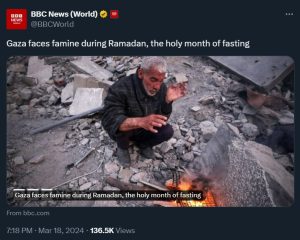
“Gaza faces famine during Ramadan, the holy month of fasting” 18/3/24, by Joel Gunter with Muath al Khatib
“The global body responsible for declaring famine, the Integrated Food Security Phase Classification (IPC), reported this Monday that 1.1 million people – virtually half the population of Gaza – was already starving and the rest of the people there could be in a famine by July.”
“According to the poverty charity Care, at least 27 people – 23 of them children – have died from malnutrition or dehydration in northern Gaza in recent weeks. The real number, according to doctors from several northern hospitals, is likely to be higher.”
“Israel denies it is intentionally starving Gazans. It has blamed the UN, which it says has created logistical challenges around aid deliveries, as well as Hamas, which Israel says has commandeered aid. The Israeli Prime Minister, Benjamin Netanyahu, denied last week that Gazans were starving. “That’s not the information we have, and we monitor it closely,” he told the media outlet Politico.
But Gazans are starving. “The facts speak for themselves,” said Abeer Etefa, the World Food Programme‘s senior spokesperson for the Middle East. “1.1 million under the IPC phase 5 – that’s catastrophic hunger. And more than a third of children under two are acutely malnourished. That means they are at risk of death.””
Notably, that item did not provide BBC audiences with either a link to the report in question or any details concerning the organisations which make up the body that produced it. Had it done so, readers would perhaps have understood that some of the organisations quoted by Gunter – including CARE and the WFP (which, via Abeer Etefa, has been promoting this topic since October 2023) are IPC partners.
In the days that followed, the BBC News website published additional items citing that IPC report (also without linking to it) and describing it as having been produced by “UN agencies” or “UN-backed”.
While the IPC does include several UN agencies, it also includes NGOs with a record of anti-Israel bias, some of whom were quoted and promoted by the BBC without clarification of their involvement in the organisation behind the report’s production, such as ‘Oxfam’ and ‘Save the Children’.
“Gaza’s entire population facing acute food insecurity, Blinken warns” 19/3/24, by Tom Bateman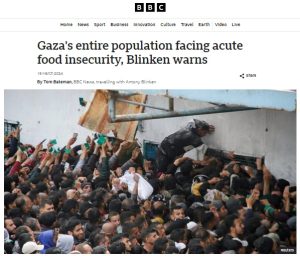
“UN agencies have said north Gaza could face famine by May without a pause in the fighting and a surge in aid.”
“Later, the UN human rights chief stressed that the catastrophic hunger in Gaza was “human-made and… entirely preventable”.
Volker Türk put the blame firmly on what he called Israel’s “extensive restrictions on the entry and distribution of humanitarian aid and commercial goods, displacement of most of the population, as well as the destruction of crucial civilian infrastructure”.
The restrictions, he warned, “may amount to the use of starvation as a method of war, which is a war crime”.
Israel’s diplomatic mission to the UN in Geneva said Mr Türk was seeking to blame it for the situation in Gaza and “completely absolve the responsibility of the UN and Hamas”.
“Israel is doing everything it can to flood Gaza with aid, including by land air and sea,” it insisted.
Aid workers reject this, saying that much of the problem in the northern Gaza is due to a collapse in security around aid convoys, after Israel targeted police who were escorting them.
Israel has said police have been hit because its military is dismantling Hamas. But the US has questioned this, saying such targeting makes aid distribution impossible and is counterproductive.”
“‘People in Gaza desperate, eating anything they can find’” 20/3/24, by Catriona Perry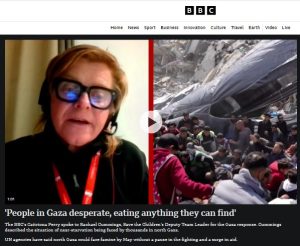
“The BBC’s Caitriona Perry spoke to Rachael Cummings, Save the Children‘s Deputy Team Leader for the Gaza response. Cummings described the situation of near-starvation being faced by thousands in north Gaza.
UN agencies have said north Gaza could face famine by May without a pause in the fighting and a surge in aid.”
“What is famine, when is it declared and why are Gaza and Sudan at risk?” 20/3/24, by Lauren Potts
“According to the UN, famine is imminent in northern Gaza, and could occur any time up to May 2024. It follows months of conflict between Israel and Hamas in Gaza after the 7 October Hamas attacks on Israel.
Half the population – about 1.1m people – are starving, according to the IPC classification. In the worst-case scenario, the entire population of Gaza will be in famine by July 2024.
The UN said Gaza had the “highest share of people facing high levels of acute food insecurity that the IPC initiative has ever classified for any given area or country”.”
“Its most senior human rights official, Volker Türk, told the BBC that Israel bore significant blame for the crisis in Gaza, and there was a “plausible” case that it was using starvation as a weapon of war. Israel has vehemently denied this.
Oxfam has accused Israel of “deliberately blocking and/or undermining the international humanitarian response in the Gaza Strip”.
It warns that people living in Gaza “will suffer mass death from disease and starvation far beyond the current 31,000 Palestinian war casualties,” unless Israel changes its approach.
The UN has increased pressure on Israel to fulfil its legal responsibilities to protect Palestinian civilians and allow adequate supplies of humanitarian aid into the region.
Israel insisted it was letting in all the aid offered, and accused agencies of failing to distribute it.”
“Blinken visits Middle East to discuss Gaza post-war plan” 20/3/24, by Tom Bateman and Rushdi Abualouf
“A UN-backed food security assessment this week said 1.1 million people in Gaza were struggling with catastrophic hunger and starvation, adding that a man-made famine in the north was imminent between now and May.”
“A UN-backed food security assessment has said 1.1 million people in Gaza are struggling with catastrophic hunger and starvation, and that a man-made famine in the north of the territory is imminent between now and May.”
“Gaza war: How the crisis is testing the limits of US diplomacy” 23/3/24, by Tom Bateman
“The American-drafted text called on Israel to surge more aid into Gaza amid UN warnings of imminent famine. […]
A UN-backed food security assessment this week said 1.1 million people in Gaza were struggling with catastrophic hunger and starvation, adding that a man-made famine in the north was imminent between now and May. […]
Israel blames the UN for a failure to distribute supplies. The UN categorically rejects this but Israel insists that checkpoint restrictions and attacks on police securing aid convoys have been a necessary part of its campaign to eliminate Hamas.”
“Israel-Gaza war: UN Secretary General Antonio Guterres in new ceasefire call” 23/3/24, by Ece Goksedef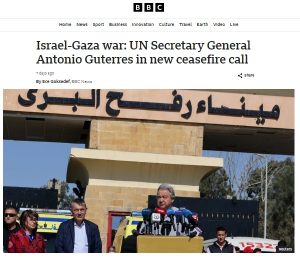
“A UN-backed food security assessment this week said 1.1 million people in Gaza were struggling with catastrophic hunger and starvation.
It added that a man-made famine in the north was imminent between now and May.”
“Speaking to BBC Middle East correspondent Hugo Bachega, Mr Guterres again urged Israel to lift the obstacles to the delivery of aid.
“It’s obvious that these obstacles are part of the way this war is being conducted in relation to Gaza,” he added.
Israel’s Foreign Minister Israel Katz hit back at Guterres on X (formerly Twitter), saying the UN chief “blamed Israel for the humanitarian situation in Gaza” without condemning Hamas fighters who “plunder” aid. […]
Western countries and aid groups have criticised Israel over its inspection process, blamed for slowing down the entry of much-needed help.”
“Gaza war: Gate 96, the new crossing where aid struggles to get in” 25/3/24, by Lucy Williamson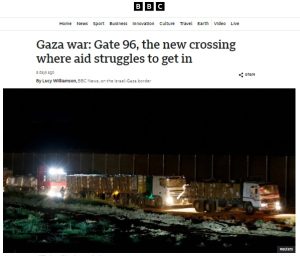
“But with the UN warning that northern Gaza is weeks away from famine, international demands to ramp up the amount of aid are getting more insistent.”
“Israel is keen to show the world it’s allowing more aid into Gaza – but says it’s not responsible for the amount of aid actually going in, or the ability of agencies to distribute it on the ground.
International law says different: that Israel has a duty, not just to open the gates, but to use all means available to it to get food and medicine to the people under its control.”
“UN Security Council passes resolution calling for Gaza ceasefire” 25/3/24, by Raffi Berg
“The US has also pressed Israel to do more to get aid delivered to Gaza, where it says the entire population is suffering severe levels of acute food insecurity.
The UN has accused Israel of obstructing aid; Israel has blamed the UN, accusing it of failing to carry out distributions.”
“Jeremy Bowen: Biden has decided strong words with Israel are not enough” 26/3/24, by Jeremy Bowen
“With Gaza in ruins, famine looming for Palestinian civilians and the prospect of many more deaths in an Israeli offensive on Rafah in southern Gaza, President Biden seems to have had enough of having his advice ignored.
Israel claims that it always respects the laws of war and denies that it blocks humanitarian aid to the people of Gaza.
But evidence has piled up that the Israelis are not telling the truth, with children dying of hunger a few miles from ample stores of food in Israel and Egypt.
The Americans, and the rest of the world, can see the evidence presented by the UN and aid agencies that Gaza is on the brink of famine.”
“Israel cancels Washington meeting after UN Gaza ceasefire vote” 26/3/24, by Christy Cooney
“Last week, Mr Blinken warned that the entire population of Gaza was experiencing “severe levels of acute food insecurity”.
The UN World Food Programme has also warned that, in Gaza’s two northern governorates, famine is expected to set in by May unless the flow of aid into the territory is increased.”
The first time audiences were offered a link to that report was on March 28th – eleven days after the BBC News website had begun promoting it.
“Gaza starvation could amount to war crime, UN human rights chief tells BBC” 28/3/24, by Jeremy Bowen – includes link to report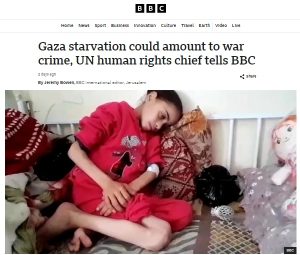
“After months of warnings, a recent UN-backed report offered hard statistical evidence that the humanitarian catastrophe in Gaza is turning into a man-made famine. […]
The UN’s most senior human rights official, Volker Türk, said in a BBC interview that Israel bore significant blame, and that there was a “plausible” case that Israel was using starvation as a weapon of war in Gaza.
Mr Türk, who is the UN high commissioner for human rights, said that if intent was proven, that would amount to a war crime.
Israel’s economy minister, Nir Barkat, a senior politician in Benjamin Netanyahu’s Likud party, dismissed Mr Türk’s warnings as “total nonsense – a totally irresponsible thing to say”.”
“Concern about humanitarian catastrophe in the Gaza Strip deepened last week with the release of a soberly written commentary alongside a series of maps, charts and statistics. It prompted more warnings from Israel’s allies that it should change the way it is fighting the war against Hamas to spare civilians from death from either high explosive or hunger.
The study is the latest report from a respected international network, the Integrated Food Security Phase Classification, known as IPC. It provides governments, the UN and aid agencies with apolitical data to measure the scale of hunger. The headline on the report was stark – “Gaza Strip: Famine is imminent as 1.1 million people, half of Gaza, experience catastrophic food insecurity.”
Its data explained how famine could come at any time in the next eight weeks or so if there was no ceasefire and relief aid did not pour into the Gaza Strip.”
“Top UN court orders Israel to allow food and medical aid into Gaza” 29/3/24, by Christy Cooney – includes link to report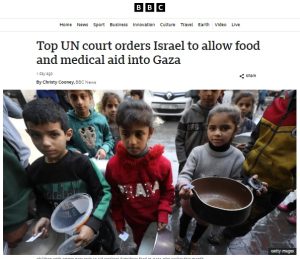
“The ICJ’s ruling comes after a report by the Integrated Food Security Phase Classification Global Initiative, which is run by the World Food Programme and others, was published last week – warning that a “catastrophic” situation was developing in Gaza.
It said that all of the 2.2 million people in Gaza were “facing high levels of acute food insecurity” and that famine was projected to hit the north of the territory before the end of May.”
As reported by the Times of Israel, on March 29th COGAT addressed claims arising from that IPC report.
“COGAT, the Israeli Defense Ministry body responsible for civilian affairs in the Palestinian territories, says in response that “the report contains multiple factual and methodological flaws, some of them serious.”
It argues the report grossly underestimated the amount of water available per person per day, notes a lack of data acknowledged by the report and reliance on information from Hamas, and notes reports in Palestinian media “every day” of “food markets filled with food of all types and kinds” in various parts of Gaza.
It says: “We outright reject any allegations according to which Israel is purposefully starving the civilian population in Gaza.”
“Even at the height of hostilities, in a war that was forced upon it, Israel places no limits on the amount of aid that can enter Gaza, and absolutely does not limit the entrance of food. Israel also facilitates entry of complementary products such as cooking gas and diesel fuel for the operation of the aid centers, bakeries etc. additionally, 14 million liters of water are supplied by Israel.
It adds that “In recent months between 150 and 200 trucks are admitted per day, most of which are food trucks. This is an 80% spike in comparison to the daily average food trucks that entered Gaza pre October 7.”
COGAT’s assessment can be downloaded from its website (just below the most recent update, here).
Given that the BBC News website uncritically promoted the IPC report in at least thirteen items published over twelve days and seeing as there is no evidence to suggest that the BBC carried out any independent assessment or verification of that report’s claims before promoting it so widely, one would of course expect BBC News website audiences to be provided with some coverage of COGAT’s clarifications.
Related Articles:
PA MEDIA ARM EMPLOYEE AGAIN CONTRIBUTES TO BBC CONTENT
BBC VERIFY TELLS A CONTEXT-FREE TALE OF DAMAGE AND DESTRUCTION

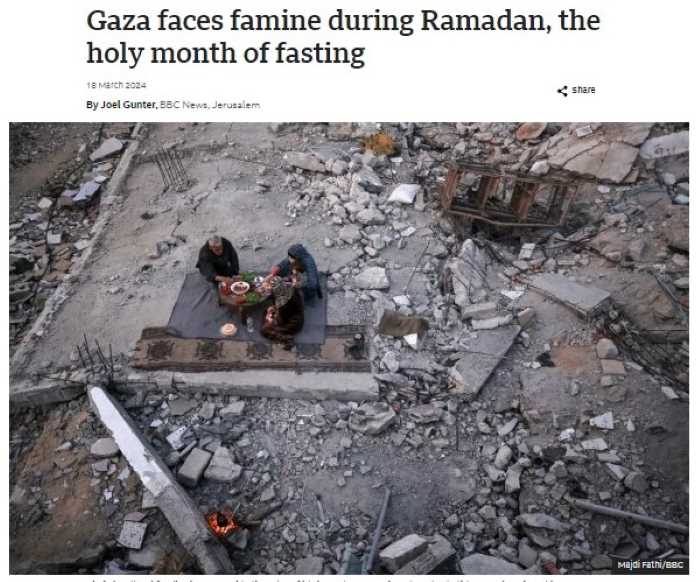
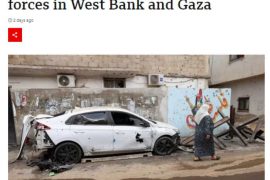

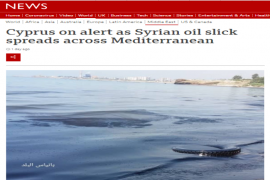

The IPC (aka BBC) has not reported that Hamas did not provide medical assistance nor food for the residents of Be-eri kibbutz after the 7 October massacre.
The BBC as usual quoting one side of a story and the wrong side of the story. Not a UN food parcel nor a tent has been offered to the 180,000 displaced residents on the ‘strip’ and the Northern border, not a single one just proving once again the rank antisemitism percolating within the United Nations #defundthebbc BBC news is not a news organisation it is the mouthpiece of Iranian Islamism